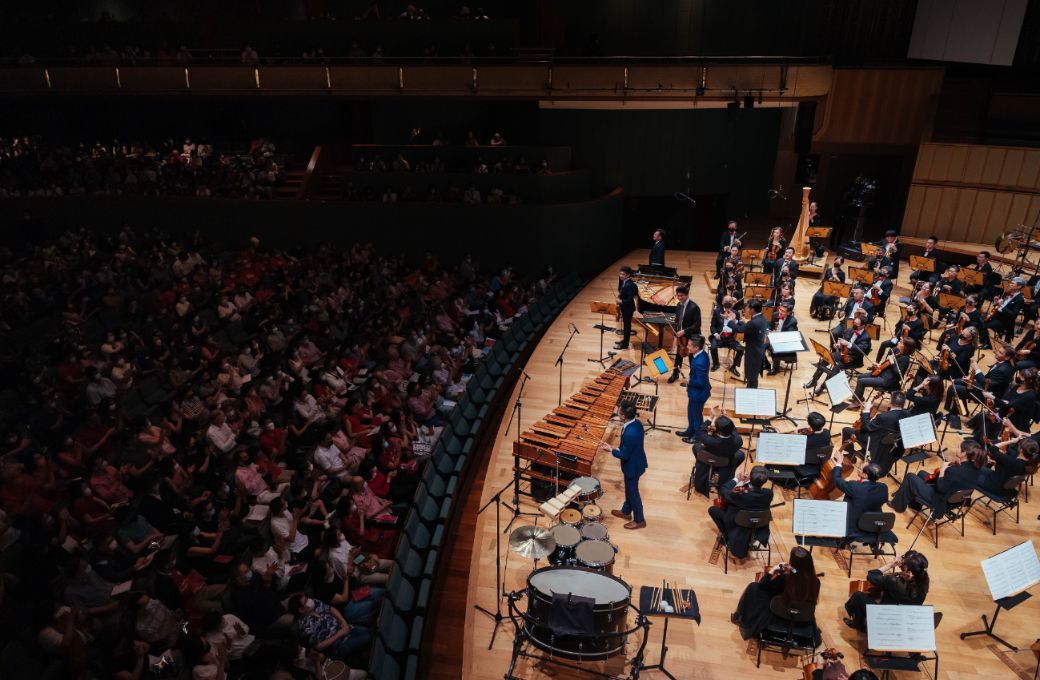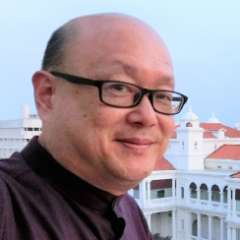Ever since 2018, the Singapore Symphony Orchestra’s National Day Concert has become the showcase of music by Singaporean composers. The 64 million dollar question inevitably arises. What is Singapore music? This leads to further questions. Who composes Singapore music? What does it sound like?

Antonin Dvořák posed similar questions about American music more than a century ago, sparking a musical revolution that inspired composers like Ives, Gershwin, Copland, Barber, Bernstein and Florence Price. Singapore’s first major post-Colonial, post-Independence composer was Leong Yoon Pin (1931-2011), notably a student of Nadia Boulanger. Although Leong’s original music did not feature in this year’s concert, newer generations of composers represented may be considered his spiritual descendents. Conducted by Grammy-nominated Singaporean Darrell Ang, himself a former student of Leong’s, the music performed was a veritable melting pot of the myriad cultures that make up Singapore society.
The concert opened with three world premieres of newly commissioned works. Wang Chenwei’s short symphonic poem Thaipusam was inspired by the Tamil (South Indian) Hindu festival day of penitence in honour of deity Lord Murugan. Playing on complex metres and rhythms from Carnatic music, evocative solos for viola and violin lead into a vibrant but sanitised view of the hot and sweaty procession characterised by self-mortification. ‘John Adams goes to Serangoon Road’ (in Singapore’s Little India) might be an apt description.
More eclectic was David Loke’s Three Sketches of Singapore, a modern concerto grosso with the Lorong Boys (“back street boys” in Malay) quintet as soloists. Comprising violinists Gabriel Lee and the composer himself, flautist Rit Xu, percussionist Joachim Lim and pianist Jonathan Shin, this “garage band” of ex-Yong Siew Toh Conservatory students had made its name busking in subway trains. Almost recounting Singapore’s history, its movements include a stormy sea shanty (the nation’s modern founder Stamford Raffles came from the Sceptred Isle, after all), an elegy with a solo from Loke à la John Williams’ Schindler’s List (remembering the genocide of ethnic Chinese perpetrated by the Japanese during WW2) and use of rattling angklungs (bamboo idiophones), before closing with a lively jazz-inflected Raindance.
Alicia de Silva’s Echoes of the Woods was the antithesis of Debussy’s Prélude à l'après-midi d'un faune. She painted a balmy night soundscape, resembling Vaughan Williams at his moodiest, before the emergence of Niranjan Pandian’s bansuri (North Indian bamboo flute). Mellow and haunting, its mystique is heightened with cellist Ng Pei Sian’s plaint, the duo completing what was the evening’s most poignant work. The oldest work was Stasis (1988) by the late Tsao Chieh (1953-1996), who made a living as an engineer and defence scientist. Its minimalism was founded on an A minor triad, a gradual crescendo of extreme calm and serenity broken by Evgueni Brokmiller’s flute (resembling the Balinese suling) and concertmaster Kong Zhao Hui’s closing violin solo reminiscent of Vaughan Williams’ The Lark Ascending. The serendipitous symmetry provided by both these two works could not have been more striking.
A combined chorus of over a hundred singers from the Singapore Symphony Choruses joined the orchestra for three popular National Day Songs: Lee Chin Sin’s Up (orchestrated by Jaffar Sidek), Benjamin Lim’s Little Big Things (combining two songs, sung in English and Chinese) and Dick Lee’s Home (arranged by Wong Lai Foon, orchestrated by Dax Wilson Liang), the last a sentimental favourite so beloved as to have become a second national anthem. Closing with the national anthem Majulah Singapura (Onward Singapore) by Zubir Said (orchestrated by Leong Yoon Pin) sung in Malay, it felt almost like the Last Night of the Proms, but without the jingoism.


